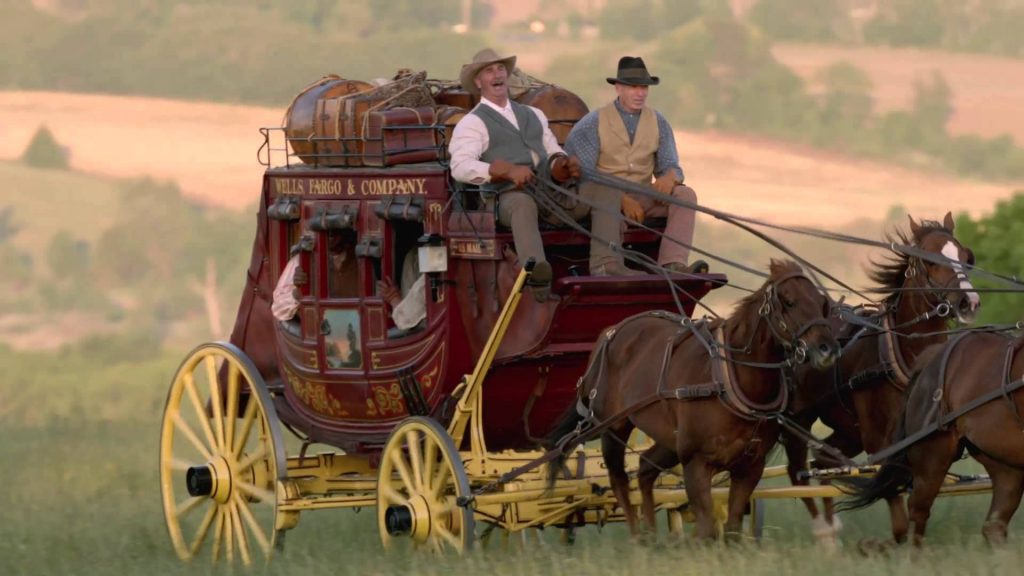October 22, 2006
Mark 10:42-45
In the days of the Old West long journeys were often accomplished by stagecoach. Much like traveling today, those who secured the use of a stagecoach could buy different levels of tickets. They could travel first class, or second class, or third class. But unlike traveling today, those levels of tickets did not indicate a different level of comfort, for all the people traveled in the same crowded and dusty coach together. The levels of tickets indicated instead different levels of responsibility. It was impossible for the stagecoach to bring along a maintenance group or support staff. Therefore, if there were some problem, if a wheel broke or the coach got stuck in the mud, it was up to the people who were on the coach to resolve it. Here is where the level of tickets came in. If you had a first-class ticket you could remain seated in the coach as other people dealt with the problem. If you had a second-class ticket you had to leave your seat to lighten the coach, but you still did not need to contribute any personal effort. If, however, you had a third-class ticket not only did you need to leave your seat but you had to remove your coat, plant your feet in the mud, and push to get the coach out of the ditch. Those who had third-class tickets had to get involved. They could not stand back. They could not watch as others did the work.
In today’s gospel, Jesus tells us that those of us who wish to travel with him all travel on third-class tickets. Those who wish to be his disciples are expected to become involved. When there is some problem in the movement of the Kingdom, those who are riding along cannot sit back and watch. Jesus says, “Whoever wishes to be great, must become the servant. Whoever wishes to be considered first, must become the servant of all.” Now clearly you and I know this commandment. We understand that following Jesus involves service, and I think all of us do serve. We serve in our families. We serve by going out of our way to help our friends. We serve by getting involved in different ways in our community. So I suppose we could approach this command of Jesus with the attitude, “We have heard and followed that command already.” In a certain sense we have. But I suggest to you that the command of Christ goes deeper than we regularly consider it to go. I think when Jesus says, “We must become the servant of all.” He intends that we take that command literally. Christians are called to serve not only those who are close to us; not only those who we like; not only those who we are comfortable serving; but, indeed, anyone who is in need. Whenever we discern some problem of power and justice in our world, we are not free to say, “That’s not my problem.” The journey that we are on with Jesus involves the entire world and everyone in it. Therefore, the problems and the issues of our world are our problems.
Today as we celebrate the Feast of St. Noel, it is obvious that St. Noel possessed that attitude. His willingness to leave the comforts of his own country and to spend his life working in the new world among the Indians in this area is a sign that he did not limit his responsibility to only what was familiar and convenient.
Now of course, we cannot do everything. Anyone of us has only so much energy, so much talent. Therefore, each one of us has to judge carefully what kind of service matches our resources and abilities. But what a Christian cannot say a priori, out of the box, is “This need is not my responsibility.” Christians must always be willing to consider in any real need, whether there is anything that they can do? Perhaps Christ is calling us to make a phone call to Aunt Louise (with whom we always had a very close relationship) to encourage her to reconcile with her sister. Perhaps Christ is calling us to reach out in support to someone at school or work that other people shun. Perhaps Christ is calling us as a person who has the time and the ability to help teach a child to read or to make some small step in addressing the problem of world hunger.
The needs of course are vast and each one of us has to personally consider whether any of those needs are needs that we can meet. But no follower of Christ should say immediately, “That need is no concern to me.” All of us who follow Christ are riding with third-class tickets, and the coach that we are riding in is all of creation and everything in it. So whenever we encounter some form of injustice or prejudice or poverty or hatred or violence, it is not our place to sit back and ask what other people are going to do. It is our role to get out of the coach and push.

